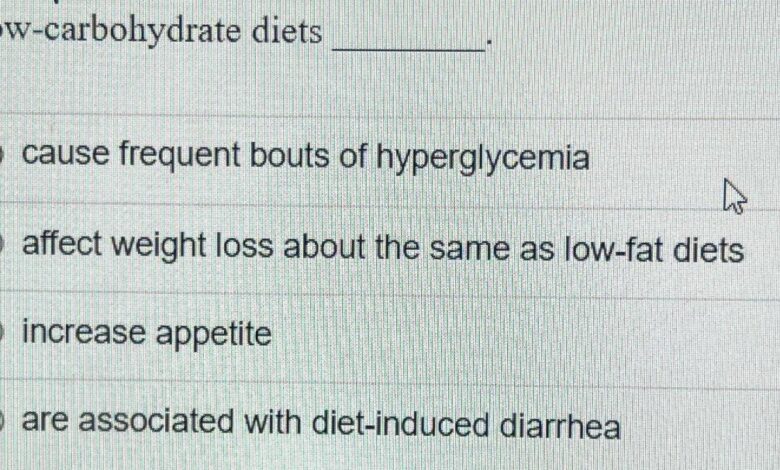
The Problem With Carb-Restricted Diets: Are They Worth It?
The problem with carb restricted diets – The problem with carb-restricted diets, like ketogenic, Atkins, and low-carb, is that they often promise quick weight loss but fail to address the long-term health consequences. While these diets can lead to initial weight reduction and improved blood sugar control, they often come with potential risks that many people don’t consider.
Restricting carbohydrates can lead to nutrient deficiencies, electrolyte imbalances, and digestive issues. These diets can also be challenging to maintain long-term, often resulting in social isolation, food cravings, and yo-yo dieting. The key is to find a sustainable approach to weight management that promotes overall health and well-being.
Understanding Carb-Restricted Diets
Carb-restricted diets, often referred to as low-carb diets, have gained significant popularity in recent years. These diets are characterized by a reduced intake of carbohydrates, typically replacing them with increased protein and fat consumption. They have become a popular choice for those seeking weight loss, improved blood sugar control, and other health benefits.
However, it’s important to understand the various types of carb-restricted diets and their potential impact on the body.
Types of Carb-Restricted Diets
There are several different types of carb-restricted diets, each with its own specific set of rules and guidelines. Some of the most common include:
- Ketogenic Diet:This diet is very strict and involves consuming a very low amount of carbohydrates, typically less than 50 grams per day. The goal is to induce a metabolic state called ketosis, where the body begins to burn fat for energy instead of glucose.
This diet typically involves a high intake of healthy fats, moderate protein, and very low carbohydrate intake.
- Atkins Diet:This diet is similar to the ketogenic diet but allows for a slightly higher intake of carbohydrates, typically between 20-50 grams per day. The Atkins diet has four phases, starting with a very strict induction phase and gradually increasing carbohydrate intake as weight loss progresses.
- Low-Carb Diet:This diet is less restrictive than the ketogenic or Atkins diet and typically involves reducing carbohydrate intake to between 50-150 grams per day. This approach allows for a wider range of food choices and may be easier to maintain long-term.
How Carb-Restricted Diets Work
Carb-restricted diets work by reducing the body’s reliance on glucose for energy. When carbohydrate intake is limited, the body begins to break down stored fat for fuel. This process, known as ketosis, leads to the production of ketones, which the body can use as an alternative energy source.
While carb-restricted diets can lead to initial weight loss, they often aren’t sustainable and can cause nutritional deficiencies. A more holistic approach to weight loss focuses on long-term lifestyle changes, like making healthier food choices and incorporating regular exercise.
Check out these 10 Simple Changes That Lead to Weight Loss for inspiration. By focusing on sustainable habits, you can achieve lasting weight loss without sacrificing your health or enjoyment of food.
Potential Benefits of Carb-Restricted Diets, The problem with carb restricted diets
Carb-restricted diets have been linked to several potential health benefits, including:
- Weight Loss:By reducing carbohydrate intake, carb-restricted diets can help create a calorie deficit, leading to weight loss. Studies have shown that these diets can be effective for short-term weight loss.
- Improved Blood Sugar Control:By limiting carbohydrate intake, carb-restricted diets can help stabilize blood sugar levels, which may be beneficial for individuals with type 2 diabetes or prediabetes.
- Reduced Inflammation:Some research suggests that carb-restricted diets may help reduce inflammation in the body, which may be beneficial for conditions like arthritis and heart disease.
Potential Health Risks and Concerns

While carb-restricted diets can be effective for short-term weight loss, they can pose significant health risks if followed long-term. These risks stem from the potential for nutrient deficiencies, electrolyte imbalances, and negative impacts on gut health.
Nutrient Deficiencies
Restricting carbohydrates can lead to deficiencies in essential nutrients, particularly those found in whole grains, fruits, and vegetables.
- Fiber:Fiber is crucial for digestive health, blood sugar control, and satiety. Carb-restricted diets often lack sufficient fiber, leading to constipation, digestive discomfort, and potential for increased risk of heart disease and type 2 diabetes.
- Vitamins and Minerals:Many essential vitamins and minerals, including B vitamins, vitamin C, vitamin E, potassium, and magnesium, are found in carbohydrate-rich foods. Deficiencies in these nutrients can lead to fatigue, weakness, hair loss, skin problems, and impaired immune function.
Electrolyte Imbalances
Carb-restricted diets can disrupt electrolyte balance, particularly sodium, potassium, and magnesium.
- Sodium:Low-carb diets often emphasize sodium restriction, which can lead to hyponatremia, a condition where the body has too little sodium. This can cause headaches, nausea, confusion, and even seizures.
- Potassium:Potassium is crucial for muscle function, nerve impulses, and blood pressure regulation. Low-carb diets can deplete potassium levels, leading to muscle weakness, fatigue, and irregular heartbeat.
- Magnesium:Magnesium is essential for over 300 bodily functions, including energy production, muscle function, and blood sugar control. Low-carb diets can deplete magnesium levels, leading to fatigue, muscle cramps, and headaches.
Gut Health Issues
Carb-restricted diets can negatively impact gut health by altering the balance of bacteria in the gut microbiome.
Let’s face it, carb-restricted diets can feel restrictive and leave you craving those comforting carbs. But who says you have to completely cut out pizza? Check out these 11 healthy pizzas under 400 calories for a satisfying, guilt-free indulgence.
Remember, moderation is key! You can enjoy your favorite foods in a balanced way without completely eliminating carbs from your diet.
- Gut Microbiome:The gut microbiome plays a vital role in digestion, immunity, and overall health. Carb-restricted diets can disrupt the balance of bacteria in the gut, potentially leading to digestive problems, inflammation, and increased risk of certain diseases.
- Prebiotics:Many carbohydrate-rich foods, such as fruits, vegetables, and whole grains, are rich in prebiotics, which are essential for nourishing beneficial bacteria in the gut. Low-carb diets often lack sufficient prebiotics, which can negatively impact gut health.
Examples of Negative Health Consequences
There are numerous examples of individuals experiencing negative health consequences from carb-restricted diets.
- Keto Flu:A common symptom of starting a ketogenic diet, keto flu is characterized by fatigue, headaches, nausea, and constipation. This is due to the body transitioning to using fat as its primary fuel source and the initial depletion of glycogen stores.
- Nutrient Deficiencies:Individuals following low-carb diets have been reported to develop deficiencies in thiamin, riboflavin, niacin, vitamin B6, vitamin B12, vitamin C, vitamin E, potassium, magnesium, and calcium. These deficiencies can lead to a range of health problems, including fatigue, weakness, hair loss, skin problems, and impaired immune function.
- Kidney Stones:Some studies suggest that low-carb diets may increase the risk of kidney stones, particularly in individuals with a history of stone formation. This is due to the increased excretion of calcium and uric acid, which can contribute to stone formation.
Comparison with Other Weight Loss Strategies
Carb-restricted diets are not the only weight loss strategy available. Other approaches, such as calorie restriction, exercise, and behavior modification, can also be effective and often pose fewer health risks.
- Calorie Restriction:Calorie restriction involves reducing overall calorie intake, regardless of the source of those calories. This approach is generally considered safe and effective for weight loss when combined with exercise and healthy eating habits.
- Exercise:Exercise plays a crucial role in weight loss and overall health. It burns calories, builds muscle, and improves cardiovascular health. Regular exercise is essential for maintaining a healthy weight and reducing the risk of chronic diseases.
- Behavior Modification:Behavior modification techniques, such as mindful eating and stress management, can help individuals develop healthier eating habits and improve their relationship with food. These techniques can be particularly helpful for maintaining long-term weight loss.
Sustainability and Long-Term Effects: The Problem With Carb Restricted Diets
While carb-restricted diets can be effective for short-term weight loss, maintaining them over the long term presents unique challenges. The restrictive nature of these diets can lead to social isolation, food cravings, and difficulty adapting to social situations, making long-term adherence a significant hurdle.
I used to think that cutting carbs was the key to weight loss, but I quickly realized that it wasn’t sustainable. I felt constantly hungry and deprived, which ultimately led to binge eating. That’s when I discovered the power of fiber! Check out this amazing guide on High Fiber Meals for Weight Loss: A Guide to Feeling Full and Slim , which helped me understand how incorporating high-fiber foods can help you feel full and satisfied, making it easier to manage your weight without feeling restricted.
Now, I focus on filling my plate with fiber-rich foods and my body feels so much better!
Psychological Factors
The restrictive nature of carb-restricted diets can significantly impact individuals’ psychological well-being. These diets often focus on eliminating entire food groups, which can lead to feelings of deprivation and an obsession with food. This restrictive eating pattern can contribute to disordered eating habits, such as binge eating or food avoidance, which can further complicate weight management efforts.
Moreover, the emphasis on achieving a specific body image can create unrealistic expectations and lead to body dissatisfaction, contributing to a negative self-image and potentially leading to eating disorders.
Yo-Yo Dieting and Weight Regain
Carb-restricted diets often result in rapid weight loss, which can be attributed to water loss and a reduction in muscle mass. However, once the diet is discontinued, the body tends to regain the lost weight, often exceeding the initial weight before the diet.
This cycle of weight loss and regain, known as yo-yo dieting, can have detrimental effects on overall health. The constant fluctuations in weight can increase the risk of developing metabolic disorders, such as insulin resistance and type 2 diabetes. Furthermore, yo-yo dieting can lead to a decrease in metabolism, making it more challenging to lose weight in the future.
Individualized Approaches and Considerations

It’s important to remember that carb-restricted diets are not a one-size-fits-all approach. What works for one person may not be suitable for another, especially considering individual health conditions, lifestyle, and personal goals.
Suitability for Different Health Conditions
The suitability of carb-restricted diets can vary depending on the individual’s health condition.
| Health Condition | Suitability | Considerations |
|---|---|---|
| Diabetes | May be beneficial, but requires careful monitoring and individualized approach. | Carb restriction can help manage blood sugar levels, but it’s crucial to consult with a healthcare professional to ensure proper insulin management and avoid potential complications. |
| Heart Disease | May be beneficial, but requires caution and personalized guidance. | Carb restriction can help lower blood pressure and cholesterol levels, but it’s essential to ensure adequate intake of healthy fats and fiber to avoid adverse effects on heart health. |
| Kidney Disease | Not generally recommended. | Carb restriction can strain the kidneys, particularly in individuals with advanced kidney disease. It’s vital to consult with a nephrologist to determine the most appropriate dietary approach. |
Factors to Consider Before Embarking on a Carb-Restricted Diet
Before starting a carb-restricted diet, it’s crucial to consider various factors, including:
- Current health status:Individuals with pre-existing health conditions should consult with their healthcare provider before making any significant dietary changes.
- Lifestyle:Carb-restricted diets can be challenging to maintain long-term, especially if they involve significant lifestyle changes.
- Personal goals:It’s essential to have realistic goals and expectations for any dietary change.
- Food preferences:Individuals should choose a carb-restricted diet that aligns with their food preferences to enhance adherence and sustainability.
- Social and cultural factors:Carb-restricted diets can be challenging to maintain in social situations or cultures where carbohydrates are a significant part of the diet.
Consulting with a Healthcare Professional
It’s essential to consult with a healthcare professional before starting any new diet, especially one that involves significant dietary restrictions. A healthcare professional can:
- Assess your individual needs and health status.
- Develop a personalized diet plan that aligns with your goals and health conditions.
- Monitor your progress and make necessary adjustments.
- Address any potential health risks or concerns.
Alternative Approaches to Weight Management
While carb-restricted diets can be effective for short-term weight loss, they often lack sustainability and can lead to nutrient deficiencies. A balanced approach to weight management that emphasizes long-term health and well-being is crucial.
Alternative Weight Management Strategies
Adopting a balanced approach to weight management involves a combination of healthy eating habits, regular physical activity, and behavioral changes. These strategies address the underlying causes of weight gain, promote long-term health, and enhance overall well-being.
- Focus on Whole Foods:Prioritize nutrient-dense foods such as fruits, vegetables, lean proteins, whole grains, and healthy fats. These foods provide essential vitamins, minerals, and fiber, which contribute to satiety and support overall health.
- Practice Portion Control:Pay attention to serving sizes and avoid overeating. Use smaller plates, measure food portions, and listen to your body’s hunger and fullness cues.
- Regular Physical Activity:Aim for at least 150 minutes of moderate-intensity aerobic activity or 75 minutes of vigorous-intensity aerobic activity per week. Incorporate strength training exercises at least twice a week to build muscle mass and boost metabolism.
- Mindful Eating:Pay attention to your food choices and eating habits. Avoid distractions while eating, savor each bite, and listen to your body’s hunger and fullness signals.
- Stress Management:Chronic stress can lead to weight gain and other health problems. Engage in stress-reducing activities such as yoga, meditation, deep breathing exercises, or spending time in nature.
- Adequate Sleep:Aim for 7-9 hours of quality sleep per night. Sleep deprivation can disrupt hormones that regulate hunger and metabolism, leading to weight gain.
- Seek Professional Guidance:Consult with a registered dietitian or a healthcare professional to develop a personalized weight management plan that addresses your individual needs and goals.
Healthy and Sustainable Eating Patterns
Here are examples of healthy and sustainable eating patterns that emphasize whole foods, portion control, and regular physical activity:
- Mediterranean Diet:This diet emphasizes fruits, vegetables, whole grains, legumes, nuts, seeds, olive oil, and fish. It is rich in antioxidants, fiber, and healthy fats, which promote heart health and weight management.
- DASH Diet:This diet is designed to lower blood pressure and is rich in fruits, vegetables, whole grains, low-fat dairy products, and lean protein sources. It is also low in saturated fat, cholesterol, and sodium.
- Flexitarian Diet:This diet is a more flexible approach to vegetarianism, allowing for occasional consumption of meat and poultry. It emphasizes plant-based foods, such as fruits, vegetables, whole grains, legumes, nuts, and seeds.
Addressing Underlying Causes of Weight Gain
These alternative approaches address the underlying causes of weight gain, promoting long-term health and well-being.
- Hormonal Imbalances:Hormones like insulin, leptin, and ghrelin play a crucial role in regulating appetite and metabolism. A balanced diet and regular exercise can help maintain hormonal balance and prevent weight gain.
- Genetic Predisposition:While genetics can influence weight, lifestyle factors play a significant role. Healthy eating habits and regular exercise can help mitigate the impact of genetic predispositions.
- Emotional Eating:Stress, boredom, or sadness can trigger emotional eating. Mindful eating practices and stress management techniques can help break this cycle.
- Lack of Sleep:Sleep deprivation disrupts hormones that regulate appetite and metabolism, leading to weight gain. Adequate sleep is essential for maintaining a healthy weight.
End of Discussion

While carb-restricted diets can offer short-term benefits, their potential downsides should not be ignored. It’s crucial to consider the long-term implications of these diets and explore alternative approaches that prioritize balanced nutrition, regular exercise, and overall well-being. Remember, sustainable weight loss is about making healthy choices that you can maintain over time, not about restricting your diet in ways that are ultimately unsustainable.






